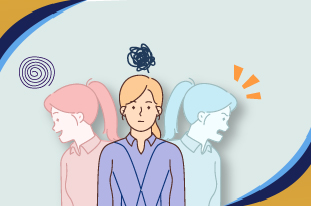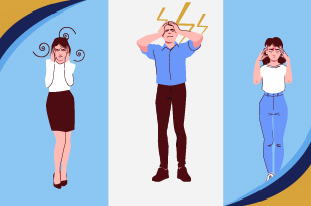Every person once in their life comes across stress that can be too intense that it can lead to some mental health issues such as psychosis. Psychosis is a severe mental health condition that can be caused due to exposure to a triggering and intense trauma or stress. The basic indicators of stress induced psychosis are hallucination and delusions.
If you want to learn about the stress induced psychosis, can stress cause psychosis, can extreme stress cause psychosis, can stress make you hallucinate, what is stress induced psychotic break, stress-induced psychosis symptoms, causes, and common treatment approaches then continue reading this blog.
What Is Stress-Induced Psychosis?
Psychosis is not a psychological issue, but a set of signs that impact a person’s brain functioning and makes them perceive the real world in a different manner. In other terms losing touch with reality is what psychosis does to a person suffering from it. However, stress induced psychosis is triggered due to extreme level stress and trauma in a person’s life. A person combating the signs of stress induced psychosis often experiences hallucinations and delusions along with disorganized thought patterns that can impact their communication.
Some Common Signs Of Stress Induced Psychosis
There are some stress induced psychosis symptoms such as:
-
Hallucinations:
The primary identifiers of stress induced psychosis is the manifestation of hallucination such as seeing, hearing, smelling, tasting, and feeling that something is there that in reality is not there. A common example of this is that you hear a voice of someone who is not there.
-
Delusions:
The second primary sign of stress induced psychosis is the appearance of delusions. These are the untrue feelings that are not true in reality such as someone is following you or spying on you and will kill you.
READ MORE: Understanding the Stages of Psychosis
-
Disorganized thinking pattern:
This means that a person quickly switches the topic they are talking on.
While experiencing psychosis, a person may feel:
- Impulsivity in their behavior
- Catatonic or frozen behavior
- Negative signs like lack of interest in the activities you once enjoyed.
Episodes usually follow a lack of self awareness. A person suffering from it is not aware that they are experiencing delusions and hallucinations.
Prominent Causes Of Stress Induced Psychosis
Usually, stress induced psychosis is caused by external stimuli. However, researchers have not found a single cause of the onset of signs of stress induced psychosis in a person. However, the most common causes are:
- The death of loved one
- Experiencing an act of intense violence
- Being a victim of abuse
- Childbirth
- War
- Car accidents
- Natural disaster
- Substance Abuse
- Brain Injuries
- Brain Tumors
Who Is More At A Risk?
Genes have a major role in development of any kind of mental health disorder including stress induced psychosis. However, anyone suffering from signs of stress induced psychosis has a diagnosis of psychotic disorder as well.

For instance, stress is the leading cause of brief psychotic disorder, this is typically an episode that lasts between 1 and 30 days. The signs will automatically resolve after the mentioned time period but have higher chances of returning in future.
A person suffering from the signs of stress induced psychosis may be any of the following:
- A female
- In their 20’s, 30’s, or 40’s
- Suffering from personality or mood disorder
- Immigrant or refugee
- Living in a developing country
Stress induced psychosis is not always linked with a stressful or traumatic situation, and not all stress induced psychosis perfectly fits on the stress induced psychotic disorder.
READ MORE: Psychosis In Elderly People: Causes, Signs, And Treatment
A genetic link can also determine which person will experience stress induced psychosis and who will not. A study conducted in 2007 successfully found that a particular genotype, namely COMT Val(158)Met genotype, is responsible for the manifestation of signs of stress induced psychosis.
Can Panic Attacks Feel Like Stress Induced Psychosis?
When a person experiences a panic attack they may feel that they are experiencing a mental breakdown. Moreover, some people may confuse panic attacks with stress induced psychosis. But, these both states are different as during a panic attack, you may feel like it is complex to think with clarity, or even talk in complete sentences. A person suffering from it may also complain that they experience dissociation, depersonalization, and derealization. While, stress induced psychosis is a completely different mental state with delusions and hallucinations as the foundation.
How Is Stress-Induced Psychosis Diagnosed?
A mental health therapist will start off with a thorough psychiatric evaluation, asking questions about what you think and various experiences to assess your symptoms. Moreover, an expert will also run certain tests to check if the signs are linked with any underlying health condition or substance use.
The diagnosis is based on the duration of the signs a person exhibits:
- Brief psychotic disorder: 1 to 30 days
- Schizophreniform disorder: 1-6 months
- Schizophrenia: longer than 6 months
Common Mental Health Conditions Linked With Stress Induced Psychosis
Psychosis is connected with a variety of mental health conditions such as:
- Acute stress disorder
- Adjustment disorders
- Dissociative disorders
- Psychosis
- Mood disorders
- Eating disorders
- Delusional disorder
- Postpartum disorder
- Psychotic depression
READ MORE: Understanding Adjustment Disorder In Children: Causes, Signs, And Treatment
Is Stress Induced Psychosis Similar To Depersonalization, Derealization, Or Dissociation?
Many people confuse stress induced with depersonalization, derealization, or even dissociation as you feel disconnected from the world which is basically the main sign of psychosis. So, the simple answer to this question is no, as the case is totally different in stress induced psychosis. Let us first understand the meaning of all three terms individually:
-
Depersonalization:
It is a situation where you feel a disconnection from your thoughts and feelings like they are not real or as if they do not belong to you. You may sometimes feel like you are outside your body, watching yourself like you are watching a movie.
-
Derealization:
It is when a person feels a disconnection from the surroundings. The people and environment around them may feel unreal. They may feel like they are distorted, artificial, or foggy.
-
Disassociation:
Out of all dissociation is a more broader term that is linked to the feelings of disconnection a person experiences from their own feelings, thoughts, and environment. As mentioned earlier it is a broad term therefore, dissociation may include depersonalization and derealization.
Therapeutic Approaches To Treat Stress Induced Psychosis
The treatment of stress induced psychosis is based on the cause of its manifestation. Some of the widely used treatment approaches include:
- Antipsychotic medications (Psychiatric medication management)
- Benzodiazepines
- Talk Therapy (group or individual therapy)
In some rare cases inpatient treatment is required in which the sufferer stays in hospital overnight and receives an under observation ongoing therapy.
READ MORE: Understanding Episodic Acute Stress: Causes, Symptoms, And Management
Bottom Line!
Stress induced psychosis is an overwhelming mental health condition with prominent signs of delusions and hallucinations. This particular mental health condition severely impacts a person’s functioning. However, the signs can be cured with the help of correct and suitable treatment methods such as antipsychotic drugs, psychotherapy, and benzodiazepines. So, if you think you might be struggling with stress induced psychosis and looking for a telehealth mental health platform then Orange Coast Psychiatry is your best pick.
























